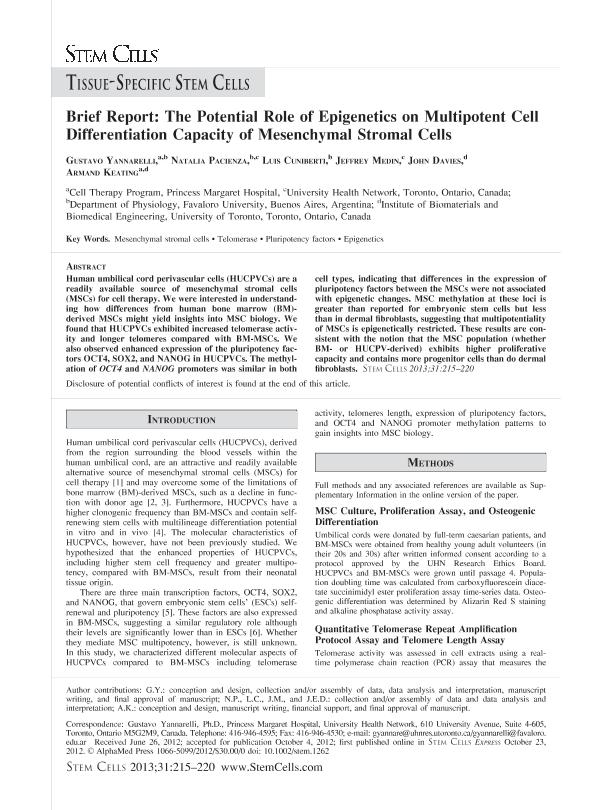Mostrar el registro sencillo del ítem
dc.contributor.author
Yannarelli, Gustavo Gabriel

dc.contributor.author
Pacienza, Natalia Alejandra

dc.contributor.author
Cuniberti, Luis Alberto

dc.contributor.author
Medin, Jeffrey
dc.contributor.author
Davies, John
dc.contributor.author
Keating, Armand
dc.date.available
2017-08-08T21:53:34Z
dc.date.issued
2013-01
dc.identifier.citation
Yannarelli, Gustavo Gabriel; Pacienza, Natalia Alejandra; Cuniberti, Luis Alberto; Medin, Jeffrey; Davies, John; et al.; The potential role of epigenetics on multipotent cell differentiation capacity of mesenchymal stromal cells; Wiley; Stem Cells; 31; 1; 1-2013; 215-220
dc.identifier.issn
1066-5099
dc.identifier.uri
http://hdl.handle.net/11336/22083
dc.description.abstract
Human umbilical cord perivascular cells (HUCPVCs) are a readily available source of mesenchymal stromal cells (MSCs) for cell therapy. We were interested in understanding how differences from human bone marrow (BM)-derived MSCs might yield insights into MSC biology. We found that HUCPVCs exhibited increased telomerase activity and longer telomeres compared with BM-MSCs. We also observed enhanced expression of the pluripotency factors OCT4, SOX2, and NANOG in HUCPVCs. The methylation of OCT4 and NANOG promoters was similar in both cell types, indicating that differences in the expression of pluripotency factors between the MSCs were not associated with epigenetic changes. MSC methylation at these loci is greater than reported for embryonic stem cells but less than in dermal fibroblasts, suggesting that multipotentiality of MSCs is epigenetically restricted. These results are consistent with the notion that the MSC population (whether BM- or HUCPV-derived) exhibits higher proliferative capacity and contains more progenitor cells than do dermal fibroblasts.
dc.format
application/pdf
dc.language.iso
eng
dc.publisher
Wiley

dc.rights
info:eu-repo/semantics/openAccess
dc.rights.uri
https://creativecommons.org/licenses/by-nc-sa/2.5/ar/
dc.subject
Mesenchymal Stromal Cells
dc.subject
Telomerase
dc.subject
Pluripotency Factors
dc.subject
Epigenetics
dc.subject.classification
Bioquímica y Biología Molecular

dc.subject.classification
Medicina Básica

dc.subject.classification
CIENCIAS MÉDICAS Y DE LA SALUD

dc.title
The potential role of epigenetics on multipotent cell differentiation capacity of mesenchymal stromal cells
dc.type
info:eu-repo/semantics/article
dc.type
info:ar-repo/semantics/artículo
dc.type
info:eu-repo/semantics/publishedVersion
dc.date.updated
2017-08-07T16:22:17Z
dc.identifier.eissn
1549-4918
dc.journal.volume
31
dc.journal.number
1
dc.journal.pagination
215-220
dc.journal.pais
Estados Unidos

dc.journal.ciudad
Hoboken
dc.description.fil
Fil: Yannarelli, Gustavo Gabriel. Universidad Favaloro; Argentina. University Health Network; Canadá. Consejo Nacional de Investigaciones Científicas y Técnicas; Argentina
dc.description.fil
Fil: Pacienza, Natalia Alejandra. University Health Network; Canadá. Universidad Favaloro; Argentina. Consejo Nacional de Investigaciones Científicas y Técnicas; Argentina
dc.description.fil
Fil: Cuniberti, Luis Alberto. Universidad Favaloro; Argentina. Consejo Nacional de Investigaciones Científicas y Técnicas; Argentina
dc.description.fil
Fil: Medin, Jeffrey. University Health Network; Canadá
dc.description.fil
Fil: Davies, John. University of Toronto; Canadá
dc.description.fil
Fil: Keating, Armand. University Health Network; Canadá. University of Toronto; Canadá
dc.journal.title
Stem Cells

dc.relation.alternativeid
info:eu-repo/semantics/altIdentifier/url/http://onlinelibrary.wiley.com/doi/10.1002/stem.1262/abstract
dc.relation.alternativeid
info:eu-repo/semantics/altIdentifier/doi/http://dx.doi.org/10.1002/stem.1262
Archivos asociados
